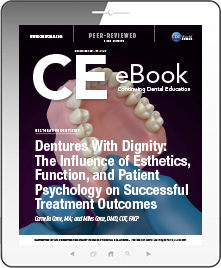CDEWorld > eBooks > Dentures With Dignity: The Influence of Esthetics, Function, and Patient Psychology on Successful Treatment Options


ADA CERP is a service of the American Dental Association to assist dental professionals in identifying quality providers of continuing dental education. ADA CERP does not approve or endorse individual courses or instructors, nor does it imply acceptance of credit house by boards of dentistry. Concerns or complaints about a CE provider may be directed to the provider or to ADA CERP at www.ada.org/cerp/

Approved PACE Program Provider. FAGD/MAGD credit. Approval does not imply acceptance by a state or provincial board of dentistry, or AGD endorsement. 1/1/2023 to 12/31/2028. ID # 209722.
eBook
Released: Wednesday, December 29, 2021
Expires: Tuesday, December 31, 2024
Dentures With Dignity: The Influence of Esthetics, Function, and Patient Psychology on Successful Treatment Options
By Cornelia Cone, MA; and Miles Cone, DMD, CDT, FACP
Commercial Supporter: Zest Dental Solutions
The treatment planning and successful delivery of removable complete denture prosthetics is predicated upon a high level of clinical skill and seamless collaboration between the patient, dental practitioner, and dental laboratory. A crucial, yet often overlooked, determinant of improved treatment outcomes and increased patient satisfaction is an understanding of the various patient psychological factors associated with tooth loss and dental restorations. This article outlines three case studies demonstrating individual patient psychological factors and esthetic and functional preferences and explains how recognition and understanding of these factors enabled patients’ preferences to be effectively addressed through the use of customized materials, case-specific protocols, and management of patient attitudes/expectations.
LEARNING OBJECTIVES:
- Describe the physiologic and psychological factors associated with the successful delivery of complete dentures
- Identify various esthetic and functional needs of patients receiving full-arch restorations with removable dental prosthetics
- Discuss how dental prostheses may be designed using customized dental restorative materials and how case-specific protocols can be utilized to address patients’ psychological, esthetic, and functional needs
About the Authors
Cornelia Cone, MA
Nuance Dental Specialists, Portland, Maine
Miles Cone, DMD, CDT, FACP
Nuance Dental Specialists, Portland, Maine


